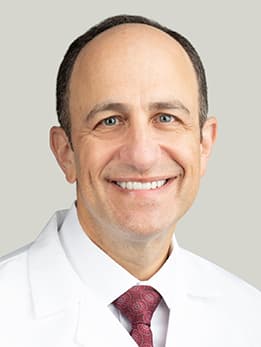COVID-19 information for patients with inflammatory bowel disease
COVID-19 is no longer a public health emergency, but it’s still an active virus that raises questions for people with inflammatory bowel disease, including Crohn's disease and ulcerative colitis.
The University of Chicago Medicine’s David T. Rubin, MD, answers common questions about COVID-19’s impact on IBD conditions.
How do I know the difference between an IBD flare-up and COVID-19?
Patients with inflammatory bowel disease who develop COVID-19 will have the same symptoms as the general population. However, it may be hard to tell the difference between an IBD flare-up and a COVID-19 infection because certain symptoms are associated with both conditions. Comparable symptoms of COVID-19 and an IBD flare-up include loss of appetite, low-grade fever, abdominal discomfort and more frequent bowel movements or loose stools.
An at-home COVID-19 test can help identify if the coronavirus is the cause of your symptoms. Let your GI doctor know if you are diagnosed with COVID-19.
Should I stop my IBD treatments if I have COVID-19?
If you are diagnosed with COVID-19, you should inform your GI doctor. Some IBD patients will not need to stop their treatments if they have COVID-19. However, some patients may need to stop their therapy for a couple weeks. This is based on which IBD treatments they are on.
We don't recommend that you stop your IBD medications without talking to your doctor first.
Should I get a COVID-19 vaccine if I have Crohn's disease or ulcerative colitis?
Yes, all Crohn’s disease and ulcerative colitis patients should get vaccinated against COVID-19. The vaccines continue to provide strong protection against severe illness and death from the virus that causes COVID-19. Reach out to your doctor or IBD care team if you have any questions or concerns about the vaccine.
Will COVID-19 vaccines cause my inflammatory bowel disease to flare up?
Research suggests the COVID-19 vaccines do not cause an increase in IBD flares. You may get a sore arm from the injection, and you may have side effects for a couple of days after being vaccinated, including fever, chills, fatigue and headaches. This is your immune system being trained to recognize and attack the virus. If those symptoms persist, contact your doctor.
Are inflammatory bowel disease patients considered immunosuppressed?
Patients who have Crohn's disease or ulcerative colitis have a chronic condition in which the immune system of the intestines is overactive. The goal of IBD treatment is not to immune suppress the patient, but rather to modify their overactive immune system so it’s under better control.
We don't think of our IBD patients at baseline as being immune suppressed. In fact, it's the opposite. When we treat them effectively, we turn down the overactive immune system just enough so their body takes over, and we minimize their risk for infections.
Listen to Dr. Russell Cohen address this question and more on an episode of ReachMD's podcast.
Do IBD patients have a higher risk of contracting COVID-19?
Being on immune therapies for inflammatory bowel disease may increase the risk for some viral infections, but based on an international registry of IBD patients who developed COVID-19, we have not seen an increased risk of contracting COVID-19 in patients who are on the standard IBD therapies.Crohn’s and ulcerative colitis patients who developed COVID-19 recover exactly like the general population.
If your IBD becomes active, we may recommend corticosteroids like prednisone. However, steroids can increase your risk of infections, which is why we want our patients to do their best to stay in remission. If you have any concerns, we suggest making an appointment with your doctor to discuss your treatment.
UChicago Medicine patients can use MyChart to send messages to their physicians.

David T. Rubin, MD
Dr. Rubin specializes in the treatment of digestive diseases. His expertise includes inflammatory bowel diseases (Crohn’s disease and ulcerative colitis) and high-risk cancer syndromes.
See Dr. Rubin's physician bioInflammatory Bowel Disease Center
Outstanding patient care is at the center of everything we do. Our world-renowned specialists not only continue to push boundaries with their leading-edge research but also integrate the latest therapies into their treatment plans to offer you the most advanced care available.
Learn more about our IBD Center
Schedule a GI Video Visit
For your convenience and safety, we offer secure and easy virtual visits for most non-urgent visit types. Our digestive disease care providers can assess your symptoms, make a diagnosis, recommend treatment and send prescriptions to your pharmacy.

Get a Second Opinion Online
Whether you are facing a complex health issue or difficult treatment decision, getting a second opinion can help you make an informed decision about your care. Get an online second opinion from one of our experts without having to leave home.
